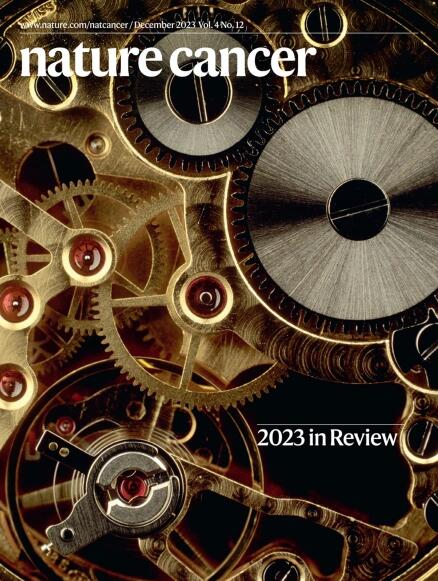Recapitulating the adenoma–carcinoma sequence by selection of four spontaneous oncogenic mutations in mismatch-repair-deficient human colon organoids
IF 23.5
1区 医学
Q1 ONCOLOGY
引用次数: 0
Abstract
Carcinogenesis results from the sequential acquisition of oncogenic mutations that convert normal cells into invasive, metastasizing cancer cells. Colorectal cancer exemplifies this process through its well-described adenoma–carcinoma sequence, modeled previously using clustered regularly interspaced short palindromic repeats (CRISPR) to induce four consecutive mutations in wild-type human gut organoids. Here, we demonstrate that long-term culture of mismatch-repair-deficient organoids allows the selection of spontaneous oncogenic mutations through the sequential withdrawal of Wnt agonists, epidermal growth factor (EGF) agonists and the bone morphogenetic protein (BMP) antagonist Noggin, while TP53 mutations were selected through the addition of Nutlin-3. Thus, organoids sequentially acquired mutations in AXIN1 and AXIN2 (Wnt pathway), TP53, ACVR2A and BMPR2 (BMP pathway) and NRAS (EGF pathway), gaining complete independence from stem cell niche factors. Quadruple-pathway (Wnt, EGF receptor, p53 and BMP) mutant organoids formed solid tumors upon xenotransplantation. This demonstrates that carcinogenesis can be recapitulated in a DNA repair-mutant background through in vitro selection that targets four consecutive cancer pathways. Mizutani et al. use a model that recapitulates the colon adenoma–carcinoma transition through the sequential elimination of media factors leading to spontaneous accumulation of hotspot mutations of mismatch-repair-deficient tumors.

通过在错配修复缺陷的人结肠器官组织中选择四种自发致癌突变,重现腺瘤-癌序列。
致癌基因突变是将正常细胞转化为侵袭性、转移性癌细胞的连续过程。结肠直肠癌就是这一过程的典范,它的腺瘤-癌序列已被详细描述,以前曾使用簇状规则间距短回文重复序列(CRISPR)在野生型人类肠道器官组织中诱导四个连续突变。在这里,我们证明了错配修复缺陷器官组织的长期培养可以通过依次停用 Wnt 激动剂、表皮生长因子(EGF)激动剂和骨形态发生蛋白(BMP)拮抗剂 Noggin 来选择自发的致癌突变,同时通过添加 Nutlin-3 来选择 TP53 突变。因此,有机体依次获得了AXIN1和AXIN2(Wnt途径)、TP53、ACVR2A和BMPR2(BMP途径)以及NRAS(EGF途径)的突变,从而完全独立于干细胞龛因子。四重通路(Wnt、EGF受体、p53和BMP)突变有机体在异种移植后形成实体瘤。这表明,通过体外选择,针对四种连续的癌变途径,可以在DNA修复突变背景下重现癌变。
本文章由计算机程序翻译,如有差异,请以英文原文为准。
求助全文
约1分钟内获得全文
求助全文
来源期刊

Nature cancer
Medicine-Oncology
CiteScore
31.10
自引率
1.80%
发文量
129
期刊介绍:
Cancer is a devastating disease responsible for millions of deaths worldwide. However, many of these deaths could be prevented with improved prevention and treatment strategies. To achieve this, it is crucial to focus on accurate diagnosis, effective treatment methods, and understanding the socioeconomic factors that influence cancer rates.
Nature Cancer aims to serve as a unique platform for sharing the latest advancements in cancer research across various scientific fields, encompassing life sciences, physical sciences, applied sciences, and social sciences. The journal is particularly interested in fundamental research that enhances our understanding of tumor development and progression, as well as research that translates this knowledge into clinical applications through innovative diagnostic and therapeutic approaches. Additionally, Nature Cancer welcomes clinical studies that inform cancer diagnosis, treatment, and prevention, along with contributions exploring the societal impact of cancer on a global scale.
In addition to publishing original research, Nature Cancer will feature Comments, Reviews, News & Views, Features, and Correspondence that hold significant value for the diverse field of cancer research.
 求助内容:
求助内容: 应助结果提醒方式:
应助结果提醒方式:


